#''All we like sheep are gone astray''?
Text
Isaiah 63: Why Do You Let Us Stray?
Isaiah was not blaming God for their sin. But Isaiah was acknowledging the spiritual truth about sin.
#Isaiah63 #Wealllikesheep #Hesed #Trinity
Seeing the Messiah and understanding that it is God’s great love for all that God has created that will move the Lord one day to right all wrongs, Isaiah began to praise God
“I will recount the gracious deeds of the Lord, the praiseworthy acts of the Lord,because of all that the Lord has done for us and the great favor to the house of Israelthat he has shown them according to his…

View On WordPress
0 notes
Text
of the full opinion that the sheep song is the best song in Messiah
#yes they're technically singing 'all we like sheep have gone astray' but with the choral stuff muddling the words a bit#it sounds exactly like they're just singing 'oh we like sheep' and I'm obsessed#messiah#george frideric handel#sheep
1 note
·
View note
Text
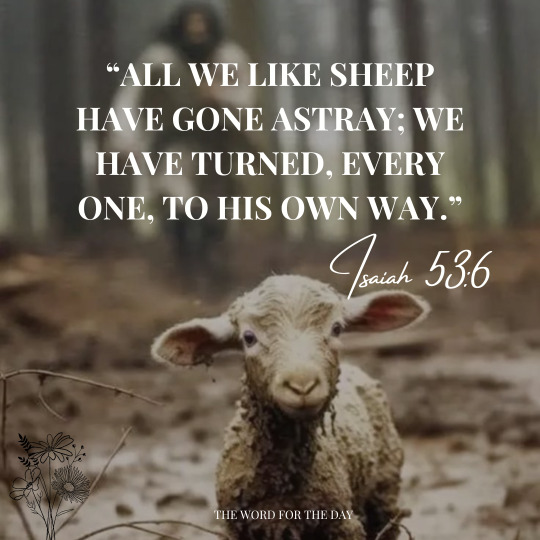
The Bible says, “All we like sheep have gone astray; we have turned, every one, to his own way” (Isaiah 53:6). Apostle Paul wrote: “There is none righteous, no, not one; there is none who understands; there is none who seeks after God. They have all turned aside” (Romans 3:10-12). That is why Jesus came. We would never seek Him, but He came seeking us. Jesus said, “I have come to seek and to save that which was lost” (Luke 19:10).
Jesus came to find us, for we could never have found Him if left to ourselves. We were wayward and wandering in our own way, but Jesus cared enough to seek after us. It is a clear expression of God’s love for us that He pursues us and desires to make us His own.
#bible verse#daily devotional#christian quotes#bible quotes#inspiration#daily devotion#christian quote#christian life#scripture#bible
146 notes
·
View notes
Text

For he shall grow up before him as a tender plant, and as a root out of a dry ground: he hath no form nor comeliness; and when we shall see him, there is no beauty that we should desire him.
He is despised and rejected of men; a man of sorrows, and acquainted with grief: and we hid as it were our faces from him; he was despised, and we esteemed him not.
Surely he hath borne our griefs, and carried our sorrows: yet we did esteem him stricken, smitten of God, and afflicted.
But he was wounded for our transgressions, he was bruised for our iniquities: the chastisement of our peace was upon him; and with his stripes we are healed.
All we like sheep have gone astray; we have turned every one to his own way; and the Lord hath laid on him the iniquity of us all.
He was oppressed, and he was afflicted, yet he opened not his mouth: he is brought as a lamb to the slaughter, and as a sheep before her shearers is dumb, so he openeth not his mouth.
He was taken from prison and from judgment: and who shall declare his generation? For he was cut off out of the land of the living: for the transgression of my people was he stricken. Isaiah 53:2-8
Artwork: Jesus Christ by Georg Cornicelius, 1888.
#bible verse#isaiah 53#old testament#hebrew bible#jesus christ#yeshua#jesus#new testament#bible#words#art#Georg Cornicelius
29 notes
·
View notes
Text

The Parable of the Lost Sheep:
Redemption and Restoration
In the parable of the Lost Sheep, Jesus conveys a deep message about the relentless pursuit of redemption and the boundless grace of God. Let us delve into this timeless story and explore its significance in our lives today.
A certain shepherd had a hundred sheep, yet one of them strayed from the fold. Undeterred by the ninety-nine, the shepherd embarked on a relentless search for the lost sheep. He scoured the hills and valleys until, at last, he found the wayward sheep, weary and alone.
Filled with compassion, the shepherd tenderly lifted the sheep onto his shoulders and rejoiced, calling together his friends and neighbors to celebrate the sheep's return. In the same way, Jesus explains, there is more joy in heaven over one sinner who repents than over ninety-nine righteous persons who need no repentance (Luke 15:3-7).
This parable reminds us of the depth of God's love and his unwavering commitment to seek out and restore the lost. Just as the shepherd pursued the lost sheep, so too does our Heavenly Father pursue each one of us with relentless love and compassion.
No matter how far we may have strayed, God's arms are always open wide, ready to welcome us back into His embrace. His grace knows no bounds, and His forgiveness is freely offered to all who humble themselves and turn back to Him.
The parable of the Lost Sheep challenges us to reflect on our own lives and consider those areas where we may have wandered away from God's path. It beckons us to return to the fold, to repent of our sins, and to experience the joy of reconciliation with our Heavenly Father.
Just as the shepherd rejoiced over the lost sheep's return, so too does God rejoice over each one of us when we turn back to Him. Our repentance brings joy to heaven, and our restored relationship with God brings fulfillment and purpose to our lives.
Broader context:
Parable of the Lost Sheep (Luke 15:3-7):
This is the main passage where the parable is found.
God's Pursuit of the Lost:
Ezekiel 34:16 - God seeks out the lost and brings them back to safety.
Isaiah 53:6 - We all, like sheep, have gone astray, but the Lord laid on Jesus the iniquity of us all.
Matthew 18:12-14 - Jesus' teaching about the shepherd who leaves the ninety-nine to seek the one lost sheep.
Psalm 119:176 - Like a lost sheep, seek your servant, for I have not forgotten your commands.
God's Rejoicing over Repentance:
Luke 15:10 - There is joy in the presence of the angels of God over one sinner who repents.
Luke 15:32 - It was fitting to celebrate and be glad, for your brother was dead, and is alive; he was lost, and is found.
Acts 3:19 - Repent therefore, and turn back, that your sins may be blotted out.
God's Unfailing Love and Faithfulness:
Psalm 23:1-3 - The Lord is my shepherd; I shall not want. He makes me lie down in green pastures. He leads me beside still waters. He restores my soul.
Psalm 36:5 - Your steadfast love, O Lord, extends to the heavens, your faithfulness to the clouds.
Psalm 136:1 - Give thanks to the Lord, for he is good, for his steadfast love endures forever.
Lamentations 3:22-23 - The steadfast love of the Lord never ceases; his mercies never come to an end; they are new every morning; great is your faithfulness.
The Shepherd's Role as a Metaphor for Jesus:
John 10:11 - I am the good shepherd. The good shepherd lays down his life for the sheep.
Hebrews 13:20 - Now may the God of peace who brought again from the dead our Lord Jesus, the great shepherd of the sheep, by the blood of the eternal covenant.
Call to Repentance and Restoration:
Joel 2:12-13 - "Yet even now," declares the Lord, "return to me with all your heart, with fasting, with weeping, and with mourning; and rend your hearts and not your garments."
Revelation 3:20 - Behold, I stand at the door and knock. If anyone hears my voice and opens the door, I will come in to him and eat with him, and he with me.
The Joy of Salvation:
Romans 15:13 - May the God of hope fill you with all joy and peace in believing, so that by the power of the Holy Spirit you may abound in hope.
Psalm 51:12 - Restore to me the joy of your salvation and uphold me with a willing spirit.
Questions:
Have I strayed from God's path, and if so, am I willing to humble myself and turn back to Him?
Do I fully grasp the depth of God's love and His relentless pursuit of me, even in my moments of wandering?
How can I share the message of God's grace and redemption with others who may feel lost or disconnected from Him?
What steps can I take to deepen my relationship with God and experience the fullness of His joy and restoration in my life?
Let us pray:
Heavenly Father, we thank you for your unwavering love and grace, demonstrated to us through the parable of the Lost Sheep. Give us the courage to humble ourselves, repent of our sins, and return to you with open hearts. May we never forget the depth of your love for us and the joy that comes from being reconciled to you. In Jesus' name, amen.
#ParableOfTheLostSheep#Redemption#Restoration#GodsLove#Grace#Repentance#Reconciliation#Joy#Sermon#Prayer#christian blog#christian faith#compassion#christianlife#christianity#jesus christ#salvation#jesus#god#biblestudy#holy bible#bible verse#bible scripture#christian#bible study#bible#biblicalteachings#biblical studies#lost sheep#good shepherd
30 notes
·
View notes
Text


Hey everyone 👋🏽
Wasn’t the “Dream” premier something? I’m still feeling quite emotional 😭
I’m working on drafting quite an extensive piece on it. I’m honestly nervous to share it because this was such a significant moment, and I want to make sure I’ve conveyed everything as best as I can. I’m hoping to get it up in the next few days, but that depends on my OCD and my schedule so please bear with me 🙏🏽
In the meantime, I wrote the below on my IG page, but I’ll leave it here too. Some of the below wordage is in my draft, and it’ll go into the event post itself, but I won’t apologize for repeating anything because it needs to be said🩷
There is sooo much to unpack, from the clothes they thoughtfully chose to wear to their first premier together (not BTS / work related), to their body language…I’m just so incredibly proud of these two.
Taehyung wore a jacket by Juntae Kim, a gender fluid clothing brand. His shirt, a rare find on Etsy, is an Oscar Wilde and Morrisey print. Oscar paved the way for gay rights, and was imprisoned for two years for his involvement with Alfred Douglas. Morrisey coined the term “human sexual” to describe himself.
Jk’s jacket is also queer coded. The sleeve is an excerpt from “Anonymous Diary of a New York Youth, Vol. 3” which was written by Taylor Mead, a columnist for the first gay newspaper in NYC. The front pocket of the jacket contains significant biblical scripture. “For all sinned, and come short of the glory of God ~All we like sheep have gone astray ~Sirs, what must I do to be saved?”
NOTHING IS COINCIDENCE WITH TAEKOOK! They’re smart. They know EXACTLY what they’re doing. Both outfits are queer coded and have deep meaning. And for their first unofficial event together to wear such meaningful clothes is loud in itself.
Not only were their outfits meaningful, their body language and expressions were too.
They’re familiar with red carpets in their line of work, but Jk was extra, adorably shy. Because this was a STATEMENT!
They didn’t walk with other members (who didn’t attend), they didn’t walk with Wooga. They walked TOGETHER.
This was about THEM.
And Tae made sure to be Jk’s safe space, as he always has been and always will be. He took his wrist when Jk hesitated before the photo wall. The way Jk looked at Tae when he turned back to take his wrist? They both knew when they walked onto the carpet exactly what that meant. How impactful it would be, the next step to normalizing their relationship. Tae guided Jk, and Jk’s expression lighting up when Tae turned speaks, trusting him, VOLUMES. They prioritize each other and they always will.
And once again, Jk showed how close he is with Wooga when he called SJ “Seo-Joonie Hyung”
They will ALWAYS choose each other. They will ALWAYS be close. No one on SM will ever change that.
They are so brave and strong. I’m in complete awe.
Taekook will change the world. I am so sure of it 🙏🏽
TAEKOOK FOREVER💜💚
Stay tuned for the post💜I hope I do it justice and I will do my very best🙏🏽
104 notes
·
View notes
Text
”Therefore the Lord himself shall give you a sign; Behold, a virgin shall conceive, and bear a son, and shall call his name Immanuel.“
Isaiah 7:14 KJV
”For unto us a child is born, unto us a son is given: and the government shall be upon his shoulder: and his name shall be called Wonderful, Counsellor, The mighty God, The everlasting Father, The Prince of Peace. Of the increase of his government and peace there shall be no end, upon the throne of David, and upon his kingdom, to order it, and to establish it with judgment and with justice from henceforth even for ever. The zeal of the LORD of hosts will perform this.“
Isaiah 9:6-7 KJV
”Who hath believed our report? and to whom is the arm of the LORD revealed? For he shall grow up before him as a tender plant, and as a root out of a dry ground: he hath no form nor comeliness; and when we shall see him, there is no beauty that we should desire him. He is despised and rejected of men; a man of sorrows, and acquainted with grief: and we hid as it were our faces from him; he was despised, and we esteemed him not. Surely he hath borne our griefs, and carried our sorrows: yet we did esteem him stricken, smitten of God, and afflicted. But he was wounded for our transgressions, he was bruised for our iniquities: the chastisement of our peace was upon him; and with his stripes we are healed.
“All we like sheep have gone astray; we have turned every one to his own way; and the LORD hath laid on him the iniquity of us all. He was oppressed, and he was afflicted, yet he opened not his mouth: he is brought as a lamb to the slaughter, and as a sheep before her shearers is dumb, so he openeth not his mouth. He was taken from prison and from judgment: and who shall declare his generation? for he was cut off out of the land of the living: for the transgression of my people was he stricken. And he made his grave with the wicked, and with the rich in his death; because he had done no violence, neither was any deceit in his mouth.
“Yet it pleased the LORD to bruise him; he hath put him to grief: when thou shalt make his soul an offering for sin, he shall see his seed, he shall prolong his days, and the pleasure of the LORD shall prosper in his hand. He shall see of the travail of his soul, and shall be satisfied: by his knowledge shall my righteous servant justify many; for he shall bear their iniquities. Therefore will I divide him a portion with the great, and he shall divide the spoil with the strong; because he hath poured out his soul unto death: and he was numbered with the transgressors; and he bare the sin of many, and made intercession for the transgressors.“
Isaiah 53:1-12 KJV
34 notes
·
View notes
Text

All we like sheep have gone astray; we have turned every one to his own way; and the Lord hath laid on him the iniquity of us all. ⏤ Isaiah 53:6 (KJV)
26 notes
·
View notes
Text

Daily Devotionals for April 30, 2024
Proverbs: God's Wisdom for Daily Living
Devotional Scripture:
Proverbs 15:13-14(KJV):
13 A merry heart maketh a cheerful countenance: but by sorrow of the heart the spirit is broken.
14 The heart of him that hath understanding seeketh knowledge: but the mouth of fools feedeth on foolishness.
Proverbs 15:13-14(Amp):
13 A glad heart makes a cheerful countenance, but by sorrow of heart, the spirit is broken.
14 The mind of him who has understanding, seeks knowledge, inquires after, and craves it, but the mouths of (self-confident) fools feed on folly.
Thought for the Day
Verse 13 - One can tell the condition of a person's heart by looking at his countenance (his facial appearance). We all know when people are happy; we can tell by the sparkle in their eyes, their smile, and their cheerful countenance. When they are old, happy people have “smile wrinkles” instead of those caused by frowning. Facial expressions reveal a lot about a person. Even children will speak up when they observe an unkind face, and they might say, "That is a mean man!"
Sorrow in the heart can also be read in the face. When we are troubled, we've probably heard someone ask us what was wrong. We all experience things in life that break our hearts. If the sorrow of the heart continues indefinitely, it can break our spirits. How can we recover from heartbreak? We must give the situation to the Lord and ask Him to heal our grief. If we have lost a loved one, we can enjoy the good memories, but we must not allow the enemy to torment us with prolonged grief. God can fill the emptiness from the loss of a mate, a child, a friend, or anything else. Jesus died, not only to give us eternal life but abundant life now. Since He bore all of our iniquities, pains, sicknesses, griefs, and sorrows, we do not have to bear them. We can receive our healing and deliverance by faith.
"Surely he hath borne our griefs, and carried our sorrows: yet we did esteem him stricken, smitten of God, and afflicted. But he was wounded for our transgressions, he was bruised for our iniquities: the chastisement of our peace was upon him, and with his stripes, we are healed. All we like sheep have gone astray; we have turned everyone to his way, and the LORD hath laid on him the iniquity of us all" (Isaiah 53:4-6).
Verse 14 — Those who have godly understanding always want to learn more about God and His ways. We can ask Him for knowledge to overcome every trial we face. God is bigger than our grief, pain, and any problem that we will ever face. He is always there to help us overcome anything the enemy is trying to do. He will rescue us in our time of need. However, we must not be like the fool who feeds on his folly, continually airing his troubles and blaming others (including God) for his circumstances. People like this feed on self-pity. When sorrow overwhelms us, we need to remember the little phrase, "This, too, shall pass." God is eternal, and He has good plans for our futures.
Prayer Devotional for the Day
Father God, thank you for always being there for me no matter what I face. I can honestly say that You have never failed me, even in my most intense trials. I have not always understood why I was going through certain things; however, I do not have to understand because You are God and You are in control, despite my lack of understanding. I know that all You require of me is to trust You and look to You in faith and You will come and save me, and bring me an answer. You always have, and You always will, because You are faithful. You never fail any of us who look to You. I have failed You, Lord, by my doubt and unbelief at times, but You have never failed me. Help us all to trust You more. I ask this in the name of the Lord, Jesus Christ. Amen.
Steven P. Miller
GatekeeperWatchman.Org
04/30/2024
7 notes
·
View notes
Photo

We all, like sheep, have gone astray, each of us has turned to our own way; and the Lord has laid on Him the iniquity of us all.
Isaiah 53:6
#bible#scripture#beauty#nature#outdoors#animal#animals#sheep#pasture#mountains#sunset#jesus#bible verse#isaiah#isaiah 53:6
253 notes
·
View notes
Text
Jesus Christ, Our Great High Priest, Redeemer, Savior and Lord
Jesus Christ, our Great High Priest, has atoned for our sins, once for all, and has reconciled us to God our Maker.
God's perfect sacrificial Lamb without blemish, offered Himself for our redemption, and is the only Mediator between God and men.
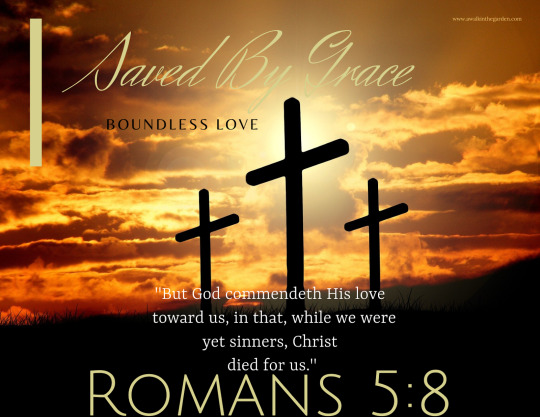
John 3:16-17
For God so loved the world that He gave His only begotten Son, that whoever believes in Him should not perish but have eternal life. For God did not send His Son into the world to condemn the world, but that the world through Him might be saved.
Ephesians 1:7
In Him we have redemption through His blood, the forgiveness of sins, according to the riches of His grace.
1 John 1:9
If we confess our sins, He is faithful and just to forgive us our sins and to cleanse us from all unrighteousness.
Hebrews 10:1-7
For the law, having a shadow of the good things to come, and not the very image of the things, can never with these same sacrifices, which they offer continually year by year, make those who approach perfect.
For then would they not have ceased to be offered? For the worshipers, once purified, would have had no more consciousness of sins. But in those sacrifices there is a reminder of sins every year. For it is not possible that the blood of bulls and goats could take away sins.
Therefore, when He came into the world, He said: "Sacrifice and offering You did not desire, but a body You have prepared for Me. In burnt offerings and sacrifices for sin You had no pleasure. Then I said, 'Behold, I have come—In the volume of the book it is written of Me—To do Your will, O God.' "
Isaiah 53:4-6
Surely He has borne our griefs and carried our sorrows; yet we esteemed Him stricken, smitten by God, and afflicted. But He was wounded for our transgressions, He was bruised for our iniquities: the chastisement for our peace was upon Him, and by His stripes we are healed. All we like sheep have gone astray; we have turned, every one, to his own way; and the Lord has laid on Him the iniquity of us all.
Hebrews 10:14
For by one offering He has perfected forever those who are being sanctified.
Hebrews 10:19-23
Therefore, brethren, having boldness to enter the Holiest by the blood of Jesus, by a new and living way which He consecrated for us, through the veil, that is, His flesh, and having a High Priest over the house of God, let us draw near with a true heart in full assurance of faith, having our hearts sprinkled from an evil conscience and our bodies washed with pure water. Let us hold fast the confession of our hope without wavering, for He who promised is faithful.
(See also Hebrews Chapters 5, 6, 7, 8, 9 and 10 in its entirety.)
Matthew 27:50-53
And Jesus cried out again with a loud voice, and yielded up His spirit. Then, behold, the veil of the temple was torn in two from top to bottom; and the earth quaked, and the rocks were split, and the graves were opened, and many bodies of the saints who had fallen asleep were raised; and coming out of the graves after His resurrection, they went into the holy city and appeared to many.
Ephesians 2:13-18
But now in Christ Jesus you who once were far off have been brought near by the blood of Christ. For He Himself is our peace, who has made both one, and has broken down the middle wall of separation, having abolished in His flesh the enmity, that is the law of commandments contained in ordinances, so as to create in Himself one new man from the two, thus making peace, and that He might reconcile them both to God in one body through the cross, thereby putting to death the enmity. And He came and preached peace to you who were afar off and to those who were near. For through Him we both have access by one Spirit to the Father.
(See Ephesians Chapter 2 in its entirety.)
The good news of God's salvation is to be proclaimed in all the earth. Whosoever will may come, both Jew and Gentile; receive God's pardon and walk in newness of life.
- A Walk In The Garden Devotions
#High Priest#Jesus Christ#Redeemer#Savior#God's salvation#God's love#Redemption#God's grace#God's mercy#Jesus Christ Died For Sinners#Faith in God#Jesus crucified#Sacrificial Lamb
9 notes
·
View notes
Text
Isaiah: "By His Stripes"
The doctrine of substitution states salvation is accomplished only through Christ's sacrifice of Himself on our behalf, and sanctification is accomplished through our sacrifice of ourselves to Jesus that we may live through Him.
#Isaiah53 #LambofGod
The Fourth Servant Song describes the Man of Sorrows in five stanzas.
Stanza 1, found at the end of Chapter 52, introduces the summary of Jesus’s exaltation.
Isaiah 52: The Fourth Servant Song
Stanza 2, found at the beginning of Chapter 53, speaks of Jesus’s early life and ministry.
Isaiah 53: Man of Sorrows
Lamb of God
Stanza 3
Surely he has borne our infirmities and carried our…

View On WordPress
#all we like sheep#by his stripes#iniquity of us all#Isaiah 53#Isaiah 53:4-6#lamb of God#Penal Substitutionary Atonement#sheep have gone astray#substitution#substitutionary atonement#we took no account of him#wounded for our transgressions
0 notes
Text

“Beloved, do not believe every spirit, but test the spirits to see whether they are from God, for many false prophets have gone out into the world." (1 John 4:1).
Christians are to be discerning hearers and readers of all messages. There are “many false prophets” or “wolves in sheep’s clothing” that try to lead us astray, presenting a false gospel that is powerless to save.
We are to compare what is being taught with the clear teaching of the Bible, the Word of God. Therefore, the way to test the spirits is to see if what is being taught is in line with the clear teaching of Scripture, like what the Berean Jews did in Acts 17:10-11.
In order to be discerning, Christians need to diligently study the Scriptures- For the Word of God is “a lamp” and “a light” to our path (Psalm 119:105).
#bible verse#daily devotional#christian quotes#bible quotes#inspiration#daily devotion#christian quote#christian life#scripture#bible
140 notes
·
View notes
Text

Like Sheep, We Have Gone Astray
5 But he was wounded for our transgressions, he was bruised for our iniquities; the chastisement of our shalom was on him; and with his stripes we are healed.
6 All we like sheep have gone astray; we have turned everyone to his own way; and the LORD has laid on him the iniquity of us all.
— Isaiah 53:5-6 | Hebrew Names Version (HNV)
The Hebrew Names Version Bible is in the public domain
Cross References: Psalm 119:176; Isaiah 6:7; Isaiah 40:2; Isaiah 53:5; Romans 4:25; 1 Corinthians 15:3; Hebrews 5:8; Hebrews 9:28; 1 Peter 2:25
#Lord#peace#sin#crucifixion#Isaiah 53:5-6#Book of Isaiah#Old Testament#HNV#Hebrew Names Version Bible
7 notes
·
View notes
Text
{English vs. Japanese Translation Comparison for Spinner’s Speech to Toga (288) w/ Commentary}
Lately I’ve been revisiting League of Villains scenes from past chapters and translating them to distract myself from life being chaotic and emotionally abusive. Below, you’ll find the product of one of my many sleepless nights.

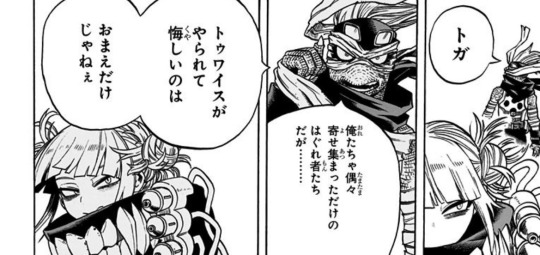
「トガ俺たちゃ偶々寄せ集まっただけのはぐれ者たちだが.........」
= “Toga, we are stray people who only met / came together / assembled by chance.........”
はぐれ / 逸れる (romaji: hagureru) means “to become separated from (e.g., one’s companions); to lose sight of; to go astray (as in off course); to wander; to become lost; to veer away; to deviate.” Essentially, it describes the situation of finding oneself alone and disconnected from self or others.
Are you familiar with the Parable of the Lost Sheep? I grew up reflecting on it, even though I’m not Christian and was not raised in a Christian household (the same allegory exists in other Abrahamic traditions as well). This next bit of exposition will borrow heavily from the analogy of the lost sheep, shepherd, and flock of ninety nine WITHOUT the religious overtones. For reference, I have included a screenshot of the Parable of the Lost Sheep as it appears in the Gospel of Luke.

Spinner is likening each of the League of Villains members to the one sheep that strays from the flock and then must contend with the harsh reality that on its own it is not likely to survive for long before it is discovered by hungry predators, suffers an injury, starves, or falls ill and dies. And yet, it cannot be assured that the shepherd, upon realizing one of his sheep has gone astray, will break from the flock (“All”), leaving the ninety nine, for the sake of searching for the wayward sheep (“One”).
This is an example of utilitarianism versus deontology in action. A utilitarian, like Hawks, would favor abandoning the missing sheep (“One”), effectively sacrificing its life, so that the shepherd remains with the flock (“All”), prioritizing the greatest *number* of sheep over the welfare of each *individual* sheep. Utilitarianism and its proponents measure the “rightness” or “wrongness” of an action by the “sum of utilities” (i.e., usefulness, results) produced rather than by considerations of beneficence, fairness, and justice. To a utilitarian, sacrificing one to save many is the “morally correct” thing to do—and therefore the “right” choice—because it would seem to benefit the *most* people (99 > 1), even if and when actions taken do direct or indirect harm to *some* people (the one sheep that had become separated from the flock and, under utilitarianism, would be abandoned by the shepherd to die). To a deontologist like Jin, however, abandoning the one for the purported sake of the many would be unthinkable, immoral, and unethical. Who is Hawks to decide for the missing sheep that its life has less value and importance than the lives of the remaining ninety nine sheep, who, unlike the one, have the benefit of the flock’s protection, even in absence of the shepherd? It would be harder for a predator to isolate and take down an integrated member of the flock than it would be to kill and devour the already isolated and defenseless sheep that strayed. A deontologist like Jin would argue that if it would be wrong to abandon the ninety nine, then it also would be wrong to abandon the one, because abandoning anyone is wrong. Wrong is wrong is wrong, regardless of circumstances. A utilitarian like Hawks would argue that it would not be cost effective to risk harm coming to the ninety nine for the sake of the one. A single sheep lost is a loss (in a similar vein to how being rained out of a highly anticipated football game is a loss), but it is a negligible one compared to the loss of five, ten, or ninety nine, which would cripple the shepherd’s profits and could cost him his livelihood. (Jin would sucker-punch Hawks in the jaw for running a cost-benefit analysis on LIVES). Where do you think that old adage “do unto others as you would have others do unto you” would fall between these two ethical perspectives? If you guessed deontology, you were right. “Treat others as you would like to be treated” is a deontological principle.
Circling back to Spinner comparing the main members of the League of Villains to sheep without a flock, he follows up his description of himself and the others as “stray people” by implying that they became for one another that which they had lost (or never had): a flock to return to, share experiences with, and find comfort, protection, and companionship in. When they first became estranged from their respective flocks, assuming they had ever had such a thing (I’m not convinced Spinner had ever had a “flock” before the League of Villains), they had no way of knowing they would ever belong to another (flock, that is, not person; people don’t own people). They could not have known they would not always be alone and wandering, hoping to avoid predators, struggling to survive without material resources or supports of any kind. After all, their assembling as the League of Villains when and how they did was random. They each had their reasons for joining the group and a few (Magne, Jin) might have even had “friendship, belonging” as one of their motivations for joining, but others (Tomura, Touya, Himiko, Spinner, Atsuhiro) were certainly not expecting to bond and develop close friendships with their comrades in arms turned found family.
“You’re not the only one devastated by Twice being killed.”
やられて means (romaji: yara rete) “to hit; to harm; to injure; to kill.” This is the action done to the sentence subject (トゥワイス : Twice). 悔しい (romaji: kuyashii) has several potential meanings, including “frustrated (over a failure, humiliation, or injustice); annoyed; chagrined; (bitterly) disappointed; bitter; vexed; regretful; sorrowful.” I tried to brainstorm for an English word that could carry the nuance of all or most of these definitions. I settled for “devastated.” To devastate is to “destroy or ruin (something)” or “cause (someone) severe and overwhelming shock or grief.” I’d say that description fits, particularly for Dabi and Toga, who had extreme negative reactions to Twice’s murder and were shown to still be grappling with the traumatic loss almost 100 chapters later in No.341.
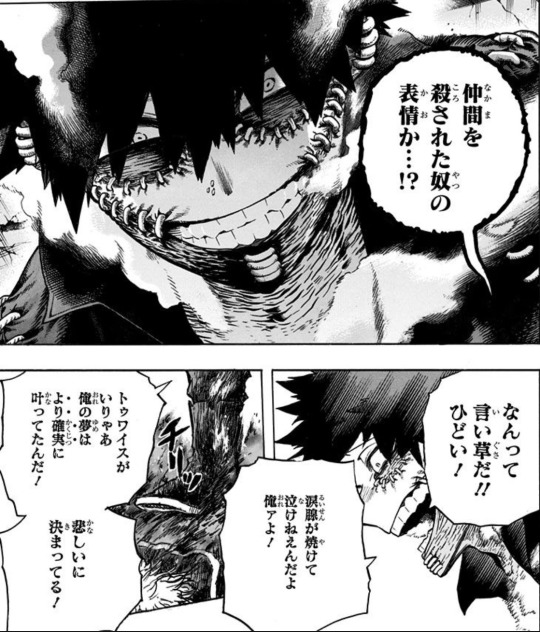
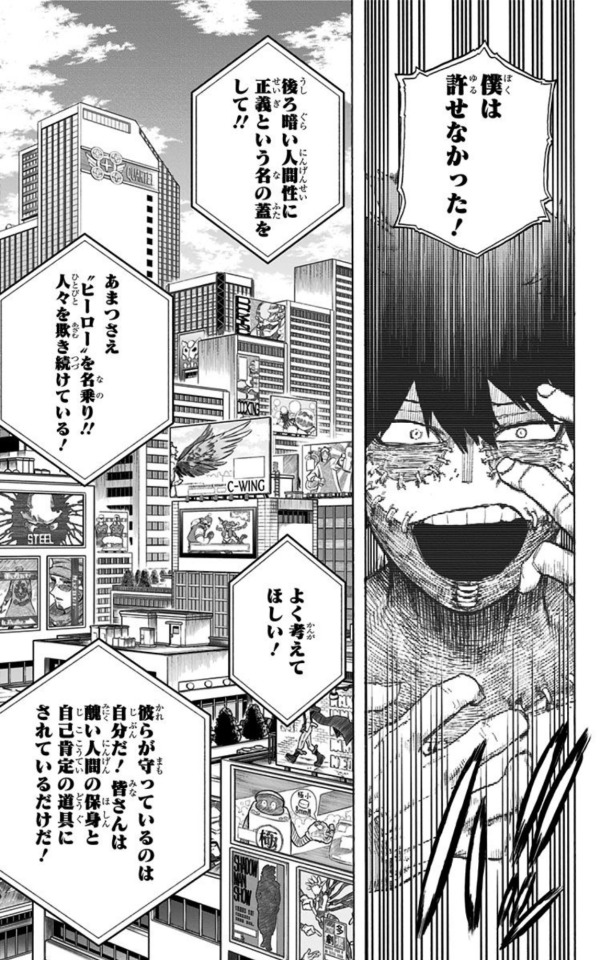

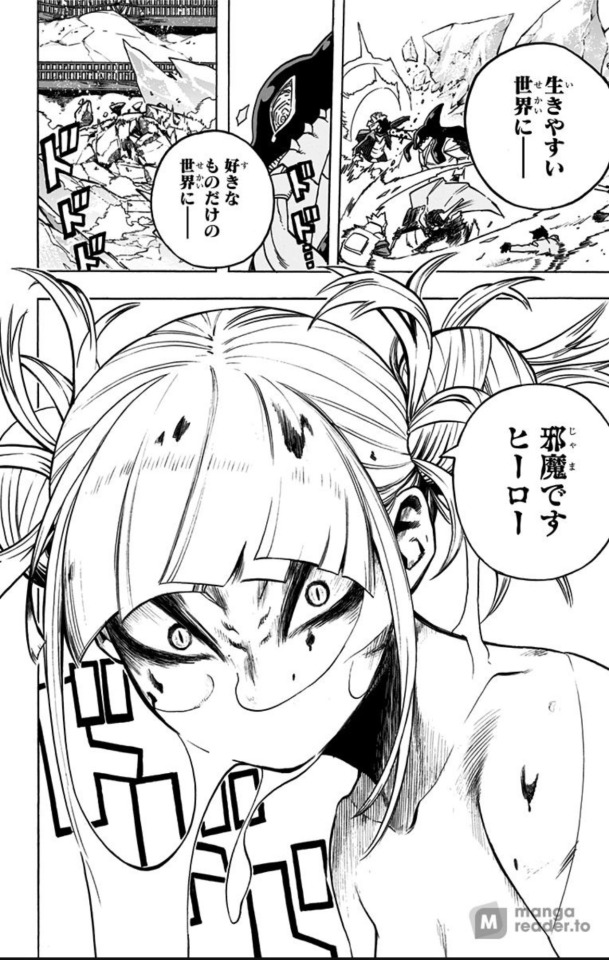
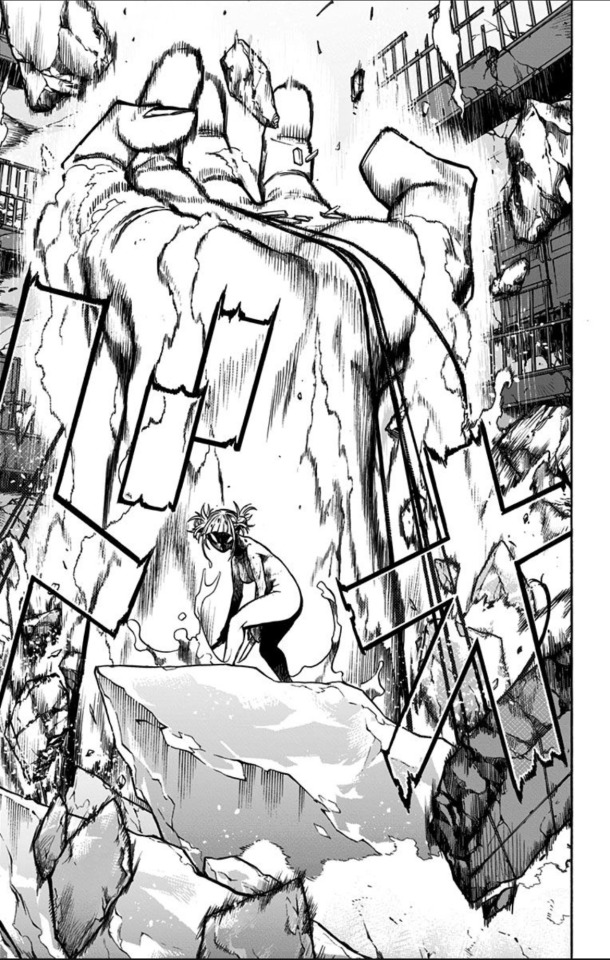
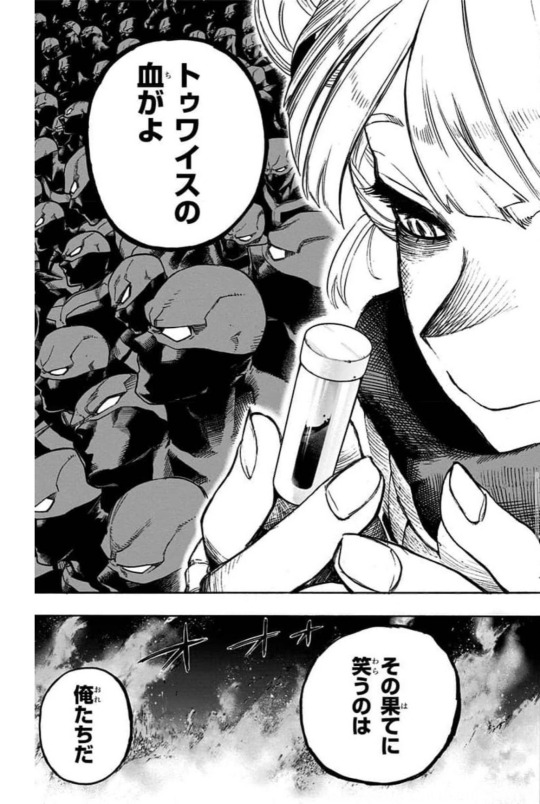

“You’re not the only one devastated by Twice being killed” became “you’re not the only one feeling messed up... over Twice” in the official English translation, which not only greatly understates the intensity of the League of Villains' feelings about their friend’s (and Himiko's older brother's) death but also conveniently omits that Spinner was explicit about Twice’s fate. He was murdered, and Spinner did not tiptoe around that fact. Spinner's ability to verbalize what happened to Twice suggests that he is not in denial about it but that it is weighing heavily on his mind and heart, enough to have prompted him to call out to Toga when he saw her preparing to run off in pursuit of Heroes, Heroes like the Hero who killed Twice.
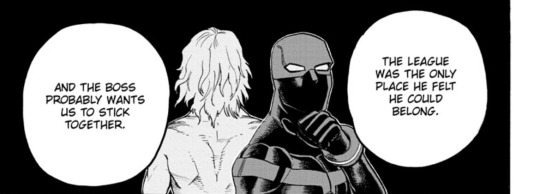

「敵連合はあいつにとって唯一の居場所で」
= “For him (Twice), the League of Villains was the only place he belonged / fit in / could be himself” or “As far as he (Twice) was concerned, the League of Villains was the only place he belonged / fit in / could be himself.”
The difference between the official English translation and direct Japanese to English translation might seem superficial at first glance, but at least in my mind, there is an important distinction to be made between them. Caleb had Spinner say that Twice “FELT” he “COULD” belong with the League of Villains, but “could” implies potential more than it does reality. Twice “COULD” belong with the League of Villains, or he *COULD NOT* belong with them. It “COULD” rain on Sunday, but it also *COULD NOT* rain on Sunday.
In Japanese Spinner doesn’t say “Twice FELT he COULD belong”; he says “Twice DID belong / fit in / could be himself.” For Twice, reality was that he had found in the League of Villains the unconditional acceptance, positive regard, and camaraderie he had searched for, empty-handed and broken-hearted, his entire life. The sole “condition” for Twice to “belong” and “fit in” with the League of Villains was simply for him to be himself. He didn’t even have to be “useful” to be accepted. Originally, Twice refused to use Double to its full capability because he was afraid of himself, afraid of losing control, afraid of disappearing, afraid of dying. Even though he had joined a fledgling crime syndicate and then plainly stated he was unwilling to contribute his “material” best to their cause, Twice was not shamed for it. He was not faulted for it. His feelings, his needs, and his boundaries were immediately and unequivocally respected by everyone. HIS best was enough for them even when it was not THE best. Who he naturally was was enough for the League of Villains. That’s what Hawks refused to hear (literally, he wasn’t listening) and failed to understand. He used Twice to gather intelligence on the League of Villains while undercover at the PLF mansion but never saw any of them for the complex, deeply wounded, but not unfeeling or compassionless individuals Twice knew them to be. Hawks saw “two-bit criminals” at best and “evil, demonic, abnormally depraved, subhuman” monsters at worst. He does not and will not or is unable to recognize the humanity in them that Twice saw.
At the end of the day, Hawks has proven that it is easier for him to ruthlessly mock and murder criminals than it is for him to listen to understand and actually help them. He’s quicker to kill than to empathize. Recognizing and respecting the humanity of others requires one to recognize and respect their own. Hawks’ actions demonstrate that he would kill adult “Keigo” before he would extend a hand to help him. Only a person willing to kill the humanity inside of themselves could have killed Jin, whose narrative purpose, as flagged by Horikoshi’s choice of his name and kanji, was to be a stand-in and representative for humanity, its duality, and the everyman. Hawks killed “Keigo” to kill “Jin.” Horikoshi even illustrates that point for us in No.264 by positioning the bottom panels to have Hawks’ feather blades, sharp and poised to strike, directed at HIM as he slaughters DOZENS of Twice clones, each one representing the same thing: humanity, its duality, and the everyman. Hawks killed Jin again and again and again and again... and every time he did, he killed part of himself, the part that makes him human.

But let’s not mince words here. While that moralistic, cutthroat, sacrifice-anyone-to-save-everyone attitude *hurts* Hawks, it *kills* people like Twice, and hurting isn't killing. (Yes, the HPSC instilled it in him and Keigo is a victim as well, but no, that does not mitigate the damage he, who is now an adult with the ability to make decisions for himself about how to behave and has long had the financial resources required to seek professional help, CHOOSES to inflict on others.) Hawks walks away from these encounters unfettered, without personal or professional consequence, and with his life, dreams, and opportunity to grow and heal intact, while the people he kills have their lives, dreams, and opportunities to grow and heal stolen from them by his hand. (Realistically, Twice was NOT Hawks’ first kill. Make no mistake, Hawks is an assassin for the HPSC. The “act” is being a cheerful, lackadaisical young man, NOT being a sanctimonious, remorseless state-sponsored killer for a corrupt government. THAT is the truth of the “Wing Hero: Hawks,” and it shows in how he thinks and operates. THAT DOES NOT MEAN HE CAN’T STILL BE ENLIGHTENED TO THAT WHICH HE HAS BEEN IN THE DARK ABOUT FROM HIS INTRODUCTION: THE ESSENCE OF HUMANITY, THE UNIVERSAL TRUTH THAT ALL IS ONE AND ONE IS ALL, AND WHEN ANY PERSON SUFFERS, ALL OF HUMANITY SUFFERS. HAWKS—OR KEIGO, RATHER—CAN GROW AND I BELIEVE HE WILL BECAUSE THE KANJI FOR HIS FULL NAME, LIKE EVERY CHARACTER IN THIS SERIES, AREN’T JUST FOR SHOW; THEY TELL US ABOUT HIS QUIRK, ABOUT HIS ARC, OR BOTH. KEIGO’S ARC IS TO *BECOME*, MEANING HE ISN’T ALREADY, ENLIGHTENED. *HE* IS THE ONE CLOAKED IN SHADOW, WANDERING AIMLESSLY IN THE DARK, NOT EVEN FULLY COGNIZANT THAT HE IS. *HE* IS THE LOST SHEEP, BUT HE *CAN* BE FOUND. HE’S JUST MOVING AT A SNAIL’S PACE AND MAKING AN ASS OF HIMSELF ALL THE WHILE. I STILL BELIEVE IN THE HERO—NO, FUCK THAT, THE PERSON—HE CAN BE. HE’S JUST NOT THERE YET. I’M ROOTING FOR HIM. I WOULDN’T THINK OR TALK SO MUCH ABOUT THIS GUY IF I HATED HIM. I LIKE HIM. I THINK HE’S BETTER THAN HOW HE’S ACTED ((AND KEEPS ACTING)). I FEEL ABOUT HIM LIKE A DISAPPOINTED PARENT DOES THEIR CHILD).
「そのボスが恐らく 「俺たちが集まること」を望んでる」
= “The boss would probably like for ‘us to come together / assemble’ like [before]” or “I suspect the boss would like for ‘us to come together / assemble’ like [before].”
恐らく (romaji: osoraku) is an adverb that means “probably; (most) likely; in all likelihood; I suspect.” 望んでる (romaji: nozon deru) is the te-iru form (indicating that an action is ongoing) of the verb 望む (romaji: nozomu), meaning “to desire; to wish for; to hope for; to pray for; to expect.”
What is Tomura (probably) wishing on a star for? For the League of Villains to be together again like they were following their genesis. He is looking forward to a return to “normal,” to having fun and bonding over video games, magic tricks, general tomfoolery, and all-around hell-raising, like they did before everything went to shit, before the wars, before AFO invaded his body and mind and started abandoning his friends to be arrested or killed. (At the end of the PLF War, to punish Tomura for failing to steal OFA and defeat Deku and Endeavor, AFO deliberately left Toga, Mr. Compress, and Gigantomachia to be captured by the Heroes. Because AFO stated that all that mattered is that Tomura’s body and Spinner escape, and because it was Mr. Compress who concealed a compressed Dabi in Spinner’s scarf ((so he would not be further targeted by the Heroes or forgotten by AFO)) and pulled Skeptic loose of fallen debris, rescuing him, it is likely AFO intended to abandon them as well).
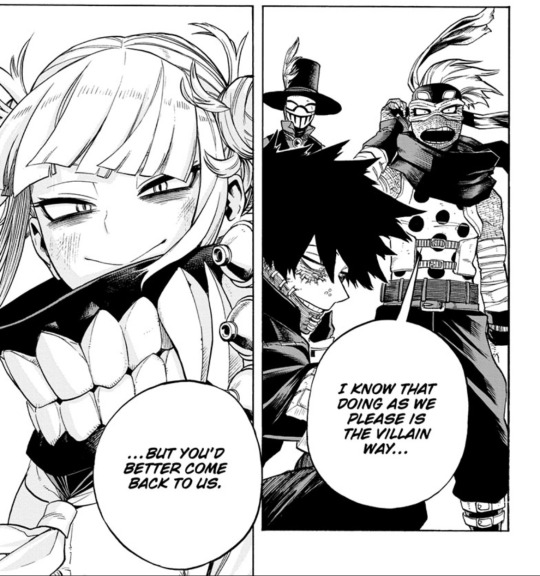
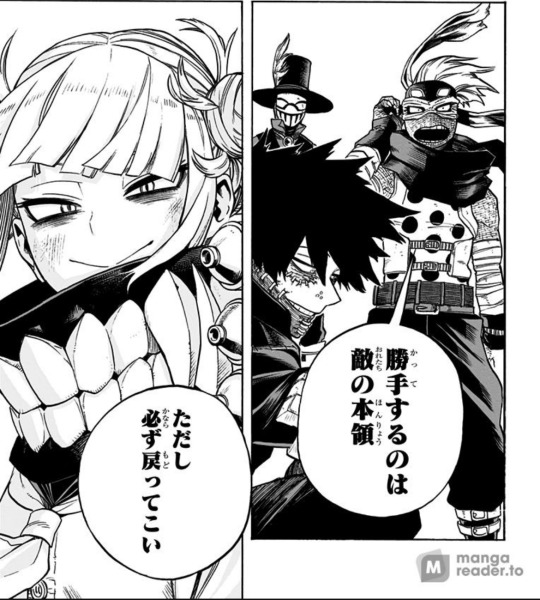
「勝手するのは敵の本領 かってするのはおれたちのほんりょう」
= “Doing as we please / acting of our own volition is our (read as: the Villain’s / League’s) specialty.”
That “our” is like an energetic cord tying Himiko to the League of Villains. It says, “You are not alone. You belong and have a home with us.”
勝手に (romaji: katte ni) means “arbitrarily; freely; of one’s own accord; without asking (permission); voluntarily; willfully; as one pleases; spontaneously; (doing something) by one’s self; one’s own convenience; one’s way.” It describes actions taken by choice, free of external influences like peer pressure or fear of punishment (e.g., criticism, shame, or expulsion from the group).
Due to his own traumatic loss of a friend to a violent end, Aizawa strives to keep his students on a tight leash to decrease the chances of something bad happening to them. To a person like Tomura, who was being raised by his parents in a highly structured and controlled environment and then groomed by AFO to become “a new [him],” having someone dictating to him how he is and is not to think, feel, and behave would feel stifling, oppressive, and triggering. He would feel like a frightened (and angry) caged animal denied its freedom and agency. Tomura hates control, and he chooses to “lead” the League of Villains by, well, hardly “leading”! Every member is encouraged to prioritize their own wishes, needs, and ambitions, and *decide for themselves* the extent to which they will function as a collective or hive mind (“we, us, our”) or as separate but interrelated and interdependent parts (“MY side project furthering OUR shared objective of disrupting the status quo and taking down Hero society”).
Touya and Himiko also grew up feeling unseen, unheard, and smothered by emotionally immature / unavailable / volatile parents who for any number of reasons failed to balance their filial responsibility to keep their children safe with their children’s natural need to be accepted, embraced, nurtured, and supported without conditions to achieve their dreams and develop a strong, healthy, *integrated* identity and self-concept, pride in themselves and their achievements, and a positive sense of community and purpose. The quickest way to alienate and chase Touya and/or Himiko away would be to try to control them, whether by force (“I’ll make you do it! You don’t have a choice about this! I’ve already decided FOR YOU!”) or coercion (“do this or else!”). Despite both having survived alone on the streets for years, proving they are perfectly capable of “roughing it” and making their own way, and despite both periodically running off to pursue their own interest, Touya and Himiko have consistently chosen to remain with the League of Villains because they were able to find in it something they had not been able to find elsewhere: unconditional acceptance, positive regard, protection, support, and companionship. The League of Villains’ dynamics “work” because everyone is free to be their authentic selves and share only as much of their stories as they are comfortable sharing—and with whom they are comfortable sharing. For example, the story implies that Dabi revealed himself to be Touya Todoroki to Tomura and Himiko, but not to the others, some time before his broadcast aired; Tomura, Touya, and Himiko all make allusions to a “plan” that we learn during the PLF War involved Dabi publicly revealing his identity as Touya Todoroki and exposing the routine violence and deception of the Number One and Number Two Heroes to shake the public out of their complacency and blind trust of Heroes. Mr. Compress and Spinner are shown to be shocked by Dabi’s revelation, with Mr. Compress remarking that he was not aware of Dabi’s connection to Endeavor and Spinner admitting that he, too, knew nothing of it. Himiko does not speak of her past often and when she does, she speaks generally, giving few details (e.g., “life is too hard,” “it’s too hard to live being me,” “when I was little, everyone kept telling me to stop being me”), skirting the surface, avoiding the deeper emotional aspects of her story, how she felt, how she was affected.
In No.341 Himiko takes Touya, but no one else, to her childhood house, which has been ransacked, vandalized, and graffitied with horrific messages insulting her and calling for her and her family’s deaths. She leaves him to read every slight against her spray painted onto the exterior walls while she walks through the interior rooms of the house, revisiting painful childhood memories of being snubbed by her own parents and sibling(s). When she is satisfied that she is ready to let go of her past life as the ever-sad-but-always-smiling abandoned child Himiko Toga, she skips out of her family house, feigning childlike lightheartedness (i.e., masking), only to be literally swept off her feet (and have her old familiar mask blown back off) by Touya suddenly blasting the Toga residence with enough force to cause a powerful explosion of fire and compressed air to tear through the structure, shattering the windows and doors and crushing the brick and mortar of the parameter walls. The house collapses into the raging inferno and is gone moments later. Stunned, she stands wringing her hands like a shy child, gently cautions him against taking such aggressive action because they will get “in trouble,” and tells him he is very kind. He repeats the word to himself, choking on it, his voice fading before he can round out the ending. He clearly wasn’t expecting to be complimented, to have his noble act acknowledged, *to be seen*. She didn’t ask him to burn her house down for her and never expected him to. He did that unprompted. We know from No.350 that he had also returned to his family residence at ~17 years old. Like the Togas had rejected and abandoned Himiko, the Todorokis had shunned and forgotten Touya first in life and then again in death. He did not need her to tell him how she felt walking through the ruins of her house to know she was hurting because he had experienced something similar and could empathize with her. He destroyed her house because it had tried to destroy her (and maybe some part of him wishes someone had cared enough about him to burn HIS house to the ground for him). He knew she had returned because she was looking for something she could not hope to find and so playfully teased her for (also) having “a heart indulged in sentiment.” He saw through her weak attempt to deny being sentimental and also saw through her attempt to skip away from her house as if her heart hadn’t just been sent through a meat grinder. He saw her, and, albeit taken aback, she responded by subtly confirming she saw him as well.
As a character, Himiko had always been defined by a neurotic desire to appear “normal” at any cost. She studied her peers for years and adapted their mannerisms to camouflage herself among them as a “happy, smiling, totally normal girl,” despite never actually identifying with them (child and young adolescent Himiko are always depicted standing apart from others, looking out of place and out of sorts, the picture of a person trying desperately to at least seem to be like everyone else; she tried to wedge a square into a circle for over a decade, but ultimately, she could not “fit” where she did not belong). Prior to joining the League of Villains, while she was still on the streets, she became adept at reading people, predicting their next moves, and adjusting her behavior to manipulate outcomes to her advantage. This is how she survived. She learned that the people she was running from day after day—Heroes and police—treated high school girls just a little more kindly, so she began cosplaying as one. She never attended high school (after attacking Saito at their middle school graduation, she took to the streets as a runaway), so she had to have stolen her uniform off of an actual student at some point. Horikoshi wrote that she thinks of her school uniform as a literal “costume.” It is a part she plays, like she might play the part of a strict schoolteacher, but it is not an accurate representation of who she is and was never meant to be. To the contrary, it was intended to be a disguise, another way for her to mask her authentic self in a bid to feel safe. If you never let anyone close enough to see you—the real you, the timid, insecure you who fears she is simultaneously “not enough” and “too much”—then you never give anyone the chance to destroy you with their rejection. If you only ever show up in parts and pieces, then it is only ever parts and pieces that are scorned, rather than the whole. It is better to burn the edges of your paper heart than to burn the meat of it. Really and truly, Himiko is NOT “like the other girls”—she didn’t have the privilege of growing up loved, supported, and protected like they did—but she knows it’s to her benefit to pretend to be. Historically, it’s worked out great for her because everyone she has put on a performance for has fallen for her act... almost everyone anyway. All Might seems to have caught onto her game.
Himiko had always been defined by her obsessive need to appear “normal,” but she took Touya and Touya alone to her house, birthplace of her traumas, because on an unconscious level she must have been hoping (and a small part of her must have trusted) he would prove her parents wrong in their assessment that no one would ever, could ever accept and love her for who she is. He delivered and then some (overachiever, always dramatic).
Everyone in the League of Villains cares about everyone in the League of Villains, but they are not all equally close. Their relationship with one does not look like their relationship with another. The most obvious examples of that are Tomura for Spinner and Himiko for Jin. For them, Tomura and Himiko, respectively, are Special. However close the relationships between members, the League of Villains has never demanded or required emotional self-disclosure for its members to be welcomed, respected, mourned, remembered.
「ただし必ず戻ってこい」
= “But be sure to come back [to us], okay?”
Spinner’s parting words to Himiko before she runs off to confront Ochako are a plaintive request that she return safely to the League of Villains after she has done what she needs to do for herself. Remember: Twice has only just been murdered. The death of their friend is fresh on their minds and heavy on their hearts. Basically, Spinner is saying, “Don’t die and don’t be caught, please. Come back to us, Toga. We’ll be waiting for you.”
Take a good look at Himiko’s face in the first panel.

You might need to zoom in to catch it, but her mouth is twisted kind of like this ~. Her back is to the League of Villains and she is looking at Spinner over her shoulder with a cagey expression. She’s wary, not because she is afraid he’ll hurt her (of course not; he would never) but because she is anticipating that he will *scold* her, like “Mama” and “Papa” did, and try to convince her to change her mind, forfeit her conviction to ask Ochako her question. Did the Heroes recognize her brother Jin as a person, no less human than their own families and friends? If yes, then how could they justify killing him when Heroes claim to be the ones *saving* lives, not *taking* them? If Heroes save lives, and Hawks really is a Hero, then Jin must not have been a person to them. And if Jin was not a person to the Heroes, then it stands to reason that she and her remaining companions are also not people to them and will be killed.
Now look at how her demeanor changes when Spinner does not try to stop her and only asks that she return safely to the League of Villains.

Dabi and Mr. Compress join Spinner on the right side of the panel so that we understand that it is not just Spinner who will be waiting for her but all of them. Himiko fills the left side of the panel, her sincere, if a bit inhibited, smile reaching her eyes, her body angled back *toward* the League of Villains, an illustrative marker signaling that she has received the message and welcomes it, is relieved for it.
#bnha 288#mha 288#bnha manga#mha manga#bnha translation#mha translation#spinner and toga#league of villains#lov#bnha manga spoilers#mha manga spoilers
26 notes
·
View notes
Text
Resurrection in Pixels - The Enigmatic Burial Shroud
We see the face cleared and enhanced version of the Shroud of Turin that has had the Shroud face itself been superimposed on top of the face of a model face. Afterwards, the documentary that gives all the information in a quick quirky video in under 7 minutes.
The Suffering Servant by the prophet Isaiah in Isaiah chapter 53.
Who has believed our message? And to whom has the arm of the LORD been revealed? For He grew up before Him like a tender shoot, And like a root out of parched ground; He has no stately form or majesty That we should look upon Him, Nor appearance that we should be attracted to Him. He was despised and forsaken of men, A man of sorrows and acquainted with grief; And like one from whom men hide their face He was despised, and we did not esteem Him. Surely our griefs He Himself bore, And our sorrows He carried; Yet we ourselves esteemed Him stricken, Smitten of God, and afflicted. But He was pierced through for our transgressions, He was crushed for our iniquities; The chastening for our well-being fell upon Him, And by His scourging we are healed. All of us like sheep have gone astray, Each of us has turned to his own way; But the LORD has caused the iniquity of us all To fall on Him. He was oppressed and He was afflicted, Yet He did not open His mouth; Like a lamb that is led to slaughter, And like a sheep that is silent before its shearers, So He did not open His mouth. By oppression and judgment He was taken away; And as for His generation, who consideredThat He was cut off out of the land of the living, For the transgression of my people, to whom the stroke was due? His grave was assigned with wicked men, Yet He was with a rich man in His death, Because He had done no violence, Nor was there any deceit in His mouth. But the LORD was pleased To crush Him, putting Him to grief; If He would render Himself as a guilt offering,He will see His offspring, He will prolong His days, And the good pleasure of the LORD will prosper in His hand. As a result of the anguish of His soul, He will see it and be satisfied; By His knowledge the Righteous One, My Servant, will justify the many, As He will bear their iniquities. Therefore, I will allot Him a portion with the great, And He will divide the booty with the strong; Because He poured out Himself to death, And was numbered with the transgressors; Yet He Himself bore the sin of many, And interceded for the transgressors.
youtube
#hebrew#isreal#jews of tumblr#jewish rabbis#jews#jewish#jew#yeshua#rabbi yeshua#god#messiah#truth#history#real history#true stories#life#Youtube
2 notes
·
View notes